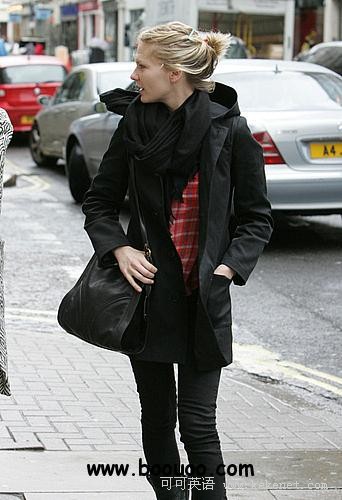(单词翻译:单击)

Let's just say that... 我们姑且说......
当你说话想要含蓄一点的时候,你就可以用“我们姑且说…..”Let's just say that…来开头,用比较委婉的方式表达自己的意思.
A:Did Terry get fired because he was a bad worker?
泰瑞被辞退,是因为他是个坏员工吗?
B:Let's just say that he wasn't the best employee in the company.
我们姑且说他不是公司里最优秀的员工吧。
A:How was your blind date? Was she pretty? 你相亲的结果如何。她漂亮吗?
B:Well, let's just say that she's not Vindy Vrawford.
呃,我们姑且说她不是辛迪克劳馥吧。
A:John seems kind of dumb, don't you think? 约翰看起来有点笨,你不觉得吗?
B:Well, let's just say he's no Albert Einstein. 呃,我们姑且说他不是爱因斯坦吧。
Sleep on it 考虑过后再做决定
Sleep on it 在字面上的意思是“趁睡觉的时候想一想”,也就是指“先不用作决定,等考虑过后在说”,通常当他人问了你一个问题,而又不逼你马上作决定的时候,对方就会跟你说这一句话:
A:I just don't know whether I need such an expensive car.
我不确定是否需要一部这么贵的车子。
B:That's ok. Sleep on it and give me a call tomorrow.
没关系。你回去考虑一下,明天再打电话给我。
Sleep on it 另一种使用时机是,当别人问你的意见看法,而你一时无法回答,你就可以说I need to sleep on it. “我得再想一想。”
A:Do you think we should accept Dave's marketing proposal?
你觉得我们应该接受戴夫提的行销计划吗?
B:I don't know. I need to sleep on it. 我不知道。我得回去想一想。
Turn sth around 让......改头换面
在美语中,若是你想要别人“转身”,你可以说turn around,而当你turn something around,最原本的意思当然是“把….翻转过来”,但是用来比喻事物的时候,就有了“将…..改头换面”的意思,表示把以往不好的东西,变得更好:
A:Wow! Your company is really expanding! 哇!你的公司真的扩张了!
B:I know! Our new president has turned the company around! 我知道!我们的新总裁已经让公司改头换面!
Catch on 学会,领悟
Catch on 在日常生活的使用上,最常见的意思有两种,一是指“学会,领悟”:
A:Mike is such a bright math student! 迈克的数学学的真棒!
B:You bet! He catches on so quickly! 没错!他学得很快!
Catch on 另外一个常见的意思是“风行,受欢迎”:
A:The rating for our show are still really low. 我们节目的收视率还是很低。
B:I know, but don't worry - it will take some time for it to catch on.
我知道,不过别担心,想让节目受欢迎要花一点时间。
Be done with... 完成......
Be done + with something / +v-ing 就是“完成了某件事”的意思。同样的概念,你也可以说成 have done something 外,be done with后面接的若是人,则表示“和某某人到此结束”的意思。
A:I'm finally done reading the novel. 我终于把小说看完了。
B:Good for you. I never thought you would finish it.
真有你的。我还以为你永远也看不完。
A:I'm telling you that I am done with you. 我告诉你,我们之间到此为止。
B:That's fine by me. I'm sick of you, too. 我无所谓。我看你也不爽。
What can I get for you? 要我拿(带)什么给你吗?
当你在餐厅的时候,你就可能会常常听到服务生说这句话,What can I get for you?这是用来问客人需要点些什么菜,或是还需要哪些其他的服务。Get something for somebody 就是“替(某人)拿…….”的意思,当你要出去买东西的时候,你也可以说can I get anything for you? 来问问别人是不是需要你帮他带些什么东西回来。
A:What can I get for you?你需要些什么吗?
B:I'd like an order of blueberry pancakes, with a side order of hash browns.
我要点蓝莓松饼,另外再加点薯饼。
A:I'm going to the store. Can I get anything for you?
我要去店里买东西。要我帮你带些什么吗?
B:No, I don't need anything. Thanks. 不了,我不用什么。谢谢。
I'm not going to give it away. 我才不会透露...
Give something away 主要有两个意思,一个是“透露(答案、秘密)”:
A:Can you tell me what the answers on yesterday’s test were?
你能告诉我昨天考试的答案吗?
B:Sorry! I can’t give the test answers away just yet.
抱歉!我现在还不能透露考试的答案。
另外一个意思是“赠送”:
A:What! You charge for water? 你们连水都要收钱?
B:I’m sorry, but it’s expensive. We can’t just give it away.
很抱歉,不过水是很贵的。我们不能免费供应。
You got me. 你问倒我了.
当别人问了你一个问题,而你却不知道答案的时候,你就可以说 you got me:
A:When did the Tang Dynasty end? 唐朝是什么时候结束的?
B:Umm….. you got me! 嗯……你问倒我了!
这句话在使用上的另一个时机是,当你做一些不想让人知道的事,却不巧被发现,这时你也可以说You got me.“你逮到我了。”
A:Didn't you say you were at home all day yesterday? 你不是说你昨天整天都在家吗?
B:That's right. 对啊!
A:Liar! I saw you with your girlfriend at the mall!
骗子!我看到你跟你女朋友在购物中心里!
B:Whoops! You got me! 糟糕!被你逮到了。
So ... after all 所以 ... 到头来
这个句型可以用来表达某件事经过一番波折,但最后还是回到原来的状况或决定。
A:It's final. We're going to Bali on our company trip. 定案了。我们公司旅游决定去巴厘岛。
B:Ah! So we are going to Indonesia after all. 啊!所以到头来我们还是要去印尼!
A:My boss finally agreed to give me a raise. 我老板终于同意给我加薪。
B:So you're not going to quit after all. 所以你就不辞职了!
Let's give a try. 我们来试一试
“give it a try” 就是放手去试试看的意思, 同样的意思你可可以说成“Let's give it a shot”或是“Let's give it go”.
A:Do you think we can finish this project today? 你觉得我们今天能把计划完成吗?
B:I don’t know, but Let’s give it a try. 我不知道,不过我们试试看。
We have a lot to catch up on. 我们可以好好叙叙旧
“catch up”是“赶上”的意思,朋友久没见面,所以“赶上”的,自然是交换彼此以往生活的点滴。若是你因故没去上课,就得要“catch up on the classes you missed,把请假时的上课进度补回来”。
A:It's been almost a year since we've seen each other. 我们快一年没见了。
B:You bet. We have a lot to catch up on. 没错。我们可以好好叙叙旧。
A:I haven't seen you in class for over a week. 我已经一个多星期没看你来上课了。
B:Well, I've been sick. I have a ton of homework to catch up on.
我一直在生病。我还有一大堆功课要赶。
Be about to ... 差不多是...的时候了
Be about to 就是指“时候到了”,“就快要…..”的意思,后面接原形动词,主语可是是人,也可以是事物。
A:The volcano is about to erupt! 火山快要爆发了!
B:Let's run for our lives. 我们逃命吧!
A:I'm almost to throw up. 我快吐出来了!
B:Quick! Run to the bathroom! 快!跑去厕所!
Remind sb of...让(某人)想起了...
.
“remind”是“提醒”的意思,“remind sb. of…”就是指一个人看到、听到了什么,而让他联想到了其他的事情。
A:You look really familiar. 你看起来好面熟。
B:I don't think we've met before. 我不觉得我们认识。
A:You remind me of a friend I had back in high school. 你让我想起我以前在高中的朋友。


